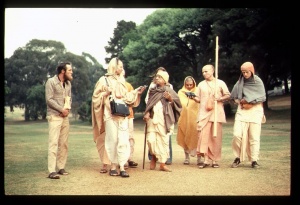SB 11.22.1-3

A.C. Bhaktivedanta Swami Prabhupada
Please note: The synonyms, translation and purport of this verse were composed by disciples of Śrīla Prabhupāda
TEXTS 1-3
- śrī-uddhava uvāca
- kati tattvāni viśveśa
- saṅkhyātāny ṛṣibhiḥ prabho
- navaikādaśa pañca trīṇy
- āttha tvam iha śuśruma
- kecit ṣaḍ-viṁśatiṁ prāhur
- apare pañca-viṁśatiṁ
- saptaike nava ṣaṭ kecic
- catvāry ekādaśāpare
- kecit saptadaśa prāhuḥ
- ṣoḍaśaike trayodaśa
- etāvattvaṁ hi saṅkhyānām
- ṛṣayo yad-vivakṣayā
- gāyanti pṛthag āyuṣmann
- idaṁ no vaktum arhasi
SYNONYMS
śrī-uddhavaḥ uvāca — Śrī Uddhava said; kati — how many; tattvāni — basic elements of creation; viśva-īśa — O Lord of the universe; saṅkhyātāni — have been enumerated; ṛṣibhiḥ — by great authorities; prabho — O my master; nava — nine (God, the individual soul, the mahat-tattva, false ego and the five gross elements); ekākaśa — plus eleven (the ten knowledge-acquiring and working senses together with the mind); pañca — plus five (the subtle forms of the sense objects); trīṇi — plus three (the modes of goodness, passion and ignorance, making altogether a total of twenty-eight); āttha — have stated; tvam — You; iha — during Your appearance in this world; śuśruma — so I have heard; kecit — some; ṣaṭ-viṁśatim — twenty-six; prāhuḥ — they say; apare — others; pañca-viṁśatim — twenty-five; sapta — seven; eke — some; nava — nine; ṣaṭ — six; kecit — some; catvāri — four; ekādaśa — eleven; apare — still others; kecit — some; saptadaśa — seventeen; prāhuḥ — say; ṣoḍaśa — sixteen; eke — some; trayodaśa — thirteen; etāvattvam — such cakulations; hi — indeed; saṅkhyānām — of the different ways of counting the elements; ṛṣayaḥ — the sages; yat vivakṣayā — with the intention of expressing what ideas; gāyanti — they have declared; pṛthak — in various manners; āyuḥ-man — O supreme eternal; idam — this; naḥ — to us; vaktum — to explain; arhasi — You should please.
Translation and purport composed by disciples of Śrīla Prabhupāda
TRANSLATION
Uddhava inquired: My dear Lord, O master of the universe, how many different elements of creation have been enumerated by the great sages? I have heard You personally describe a total of twenty-eight—God, the jīva soul, the mahat-tattva, false ego, the five gross elements, the ten senses, the mind, the five subtle objects of perception and the three modes of nature. But some authorities say that there are twenty-six elements, while others cite twenty-five or else seven, nine, six, four or eleven, and even others say that there are seventeen, sixteen or thirteen. What did each of these sages have in mind when he calculated the creative elements in such different ways? O supreme eternal, kindly explain this to me.
PURPORT
Lord Kṛṣṇa thoroughly explained in the previous chapter that Vedic knowledge is not meant for sense gratification but for liberation from material bondage. Now Uddhava presents some intermediate questions that must be answered so the path of liberation will be clear. Different philosophers have historically disagreed over the exact number of material elements, about the existence and nonexistence of particular external objects and about the existence of the soul itself. The jñāna-kāṇḍa section of the Vedas aims at liberation through analytic understanding of the material world and of the spirit soul as a transcendental element beyond matter. Ultimately the Supreme Lord Himself stands above all elements and maintains them by His personal potency. Uddhava mentions in numerical terms different methodologies of various sages, citing first the Lord's own opinion. The word āyuṣman, or "possessing eternal form," is significant in this regard. Since Lord Kṛṣṇa is eternal, He possesses all knowledge of past, present and future and is thus the original and supreme philosopher.
According to Śrīla Viśvanātha Cakravartī Ṭhākura, the different analytic approaches mentioned by Śrī Uddhava are actually not contradictory, since they are different methods of categorizing the same reality. Atheistic speculation on reality does not recognize the existence of God; consequently it is a worthless attempt to explain the truth. The Lord Himself empowers different living entities to speculate and speak on reality in different ways. The actual reality, however, is the Lord Himself, who will now speak to Śrī Uddhava.